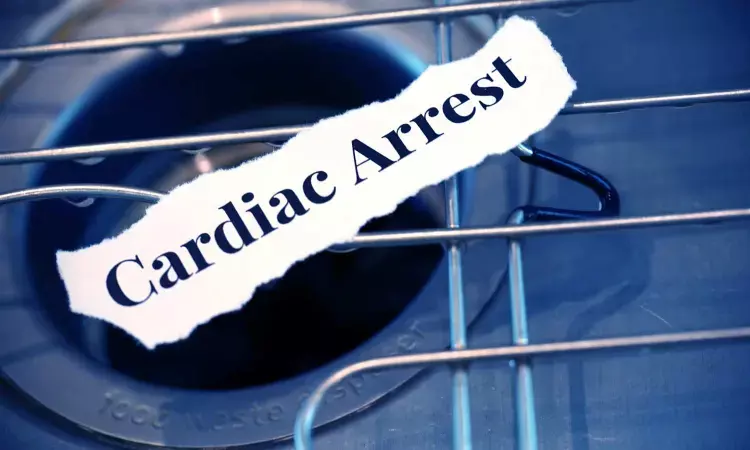- Home
- Medical news & Guidelines
- Anesthesiology
- Cardiology and CTVS
- Critical Care
- Dentistry
- Dermatology
- Diabetes and Endocrinology
- ENT
- Gastroenterology
- Medicine
- Nephrology
- Neurology
- Obstretics-Gynaecology
- Oncology
- Ophthalmology
- Orthopaedics
- Pediatrics-Neonatology
- Psychiatry
- Pulmonology
- Radiology
- Surgery
- Urology
- Laboratory Medicine
- Diet
- Nursing
- Paramedical
- Physiotherapy
- Health news
- Fact Check
- Bone Health Fact Check
- Brain Health Fact Check
- Cancer Related Fact Check
- Child Care Fact Check
- Dental and oral health fact check
- Diabetes and metabolic health fact check
- Diet and Nutrition Fact Check
- Eye and ENT Care Fact Check
- Fitness fact check
- Gut health fact check
- Heart health fact check
- Kidney health fact check
- Medical education fact check
- Men's health fact check
- Respiratory fact check
- Skin and hair care fact check
- Vaccine and Immunization fact check
- Women's health fact check
- AYUSH
- State News
- Andaman and Nicobar Islands
- Andhra Pradesh
- Arunachal Pradesh
- Assam
- Bihar
- Chandigarh
- Chattisgarh
- Dadra and Nagar Haveli
- Daman and Diu
- Delhi
- Goa
- Gujarat
- Haryana
- Himachal Pradesh
- Jammu & Kashmir
- Jharkhand
- Karnataka
- Kerala
- Ladakh
- Lakshadweep
- Madhya Pradesh
- Maharashtra
- Manipur
- Meghalaya
- Mizoram
- Nagaland
- Odisha
- Puducherry
- Punjab
- Rajasthan
- Sikkim
- Tamil Nadu
- Telangana
- Tripura
- Uttar Pradesh
- Uttrakhand
- West Bengal
- Medical Education
- Industry
Sports-related sudden cardiac arrest rare in older adults

The annual incidence of sports-related sudden cardiac arrest in older adults is rare: 2 to 3 cases per 100,000 people.
Of the 4,078 total sudden cardiac arrest cases studied in people 65 and older, 77 (1.9%) occurred during or following an exercise activity, such as cycling, gym workout, running, or playing golf or tennis. Most of the cardiac arrests occurred in men (91%).
Investigators also analyzed medical records, which were available for 47 people with sports-related cardiac arrest and 3,162 for people with non-sports-related cardiac arrest. This analysis revealed that people who experienced sudden cardiac arrest during or shortly after exercise were more likely to have fewer cardiovascular risk factors and other health issues than people who did not experience exercise-related sudden cardiac arrest.
People who experienced sports-related cardiac arrest were also more likely to experience it in a public location, which contributed to being four times more likely to survive than those who experienced a non-sports-related cardiac arrest.
A sudden cardiac arrest occurs when an electrical malfunction causes a person’s heart to stop beating. This is an extremely dangerous event, with most people dying within minutes. The good news is that in recent years, the occurrence of sudden cardiac arrest has decreased among people of working age. But for older people, the rates of sudden cardiac arrest have increased.
Exercise is one of the most heart-healthy habits to engage in. In rare cases, however, it can trigger an irregular heart rhythm that leads to sudden cardiac arrest.
Investigators analyzed sudden cardiac arrests that have occurred among people age 65 and older in Portland, Oregon, and Ventura County, California. To do this, they reviewed data collected as part of two prospective studies: The Oregon Sudden Unexpected Death Study, which has been ongoing since 2002, and the Ventura Prediction of Sudden Death in Multi-ethnic Communities study, which has been ongoing since 2015. The data excluded people who experienced sudden cardiac arrest while hospitalized and people for whom resuscitation was not attempted.
People who died from sudden cardiac arrest during sports activity or within one hour of the activity were categorized as having sports-related sudden cardiac arrest.
The findings reveal that even though sports activity is steadily rising in older adults, sudden cardiac arrest triggered by sports activity is uncommon. Furthermore, people who have sudden cardiac arrest with exercise tend to have fewer comorbidities and cardiovascular risk factors than people who have sudden cardiac arrest not triggered by exercise. Taken together, the benefits of sports activity likely outweigh the risk of associated sudden cardiac arrest risk, the authors conclude.
“The annual incidence of sports-related sudden cardiac arrest among older adults is extremely rare,” said Sumeet S. Chugh, MD, the Pauline and Harold Price Chair in Cardiac Electrophysiology Research, director of the Heart Rhythm Center in the Smidt Heart Institute at Cedars-Sinai, and senior author of the study. “This means older people who regularly participate in sports should continue. Those who develop new symptoms should consult their physician. Those who want to start should be encouraged to do so, but only after consulting their physician and obtaining an exercise prescription.”
Reference:
Lauri Holmstrom, Harpriya S. Chugh, Audrey Uy-Evanado, Arayik Sargsyan, Chad Sorenson, Shiva Salmasi, Faye L. Norby, Sean Hurst, Christopher Young, Angelo Salvucci, Jonathan Jui, Kyndaron Reinier, and Sumeet S. Chugh J Am Coll Cardiol EP. Jan 18, 2023. Epublished DOI: 10.1016/j.jacep.2022.10.033
Dr Kamal Kant Kohli-MBBS, DTCD- a chest specialist with more than 30 years of practice and a flair for writing clinical articles, Dr Kamal Kant Kohli joined Medical Dialogues as a Chief Editor of Medical News. Besides writing articles, as an editor, he proofreads and verifies all the medical content published on Medical Dialogues including those coming from journals, studies,medical conferences,guidelines etc. Email: drkohli@medicaldialogues.in. Contact no. 011-43720751


